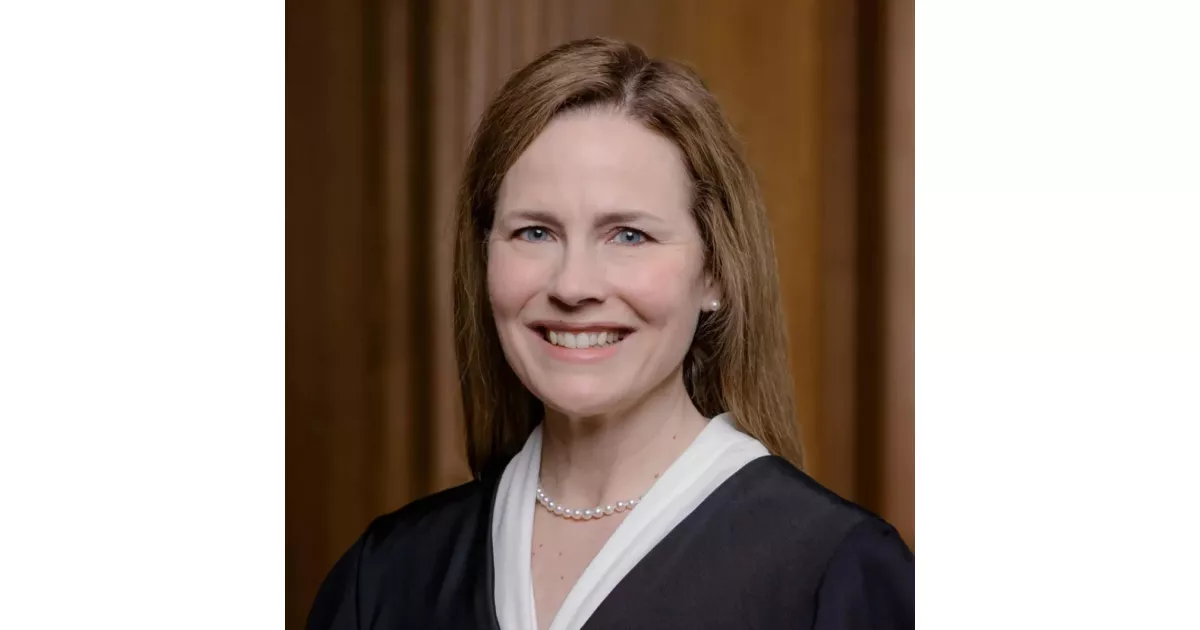Public opinion and media debates around Amy Coney Barrett—discover key moments of controversy.
Amy Coney Barrett is an American lawyer and jurist who serves as an associate justice of the Supreme Court of the United States since 2020. Nominated by President Donald Trump, she is the fifth woman to hold this position. Prior to her appointment to the Supreme Court, she served as a U.S. circuit judge of the U.S. Court of Appeals for the Seventh Circuit from 2017 to 2020.
1973: Mention of Roe v. Wade
In 2013, Barrett referenced Roe v. Wade (1973) in a Texas Law Review article, arguing it lacked widespread support as a 'superprecedent'.
1992: Reference to Planned Parenthood v. Casey
In 2013, Barrett referenced Planned Parenthood v. Casey (1992) in a Texas Law Review article, using it as evidence that Roe v. Wade had not attained the status of 'superprecedent'.
1998: Co-authored Law Review Article
In 1998, Amy Coney Barrett co-wrote a law review article with Professor John H. Garvey, which was discussed during her Senate Judiciary Committee hearing in 2017. The article argued that Catholic judges should in some cases recuse themselves from death penalty cases due to moral objections.
2006: Anti-Abortion Advertisement
In 2006, Barrett signed an anti-abortion advertisement placed by St. Joseph County Right to Life, opposing abortion on demand and defending the right to life from fertilization to natural death.
2012: Criticism of Roberts' Opinion on the Affordable Care Act
Barrett has been critical of the majority opinion written by Chief Justice John Roberts in National Federation of Independent Businesses v. Sebelius (2012), which upheld the constitutionality of the Affordable Care Act's individual mandate.
2012: Letter Criticizing Obama Administration's Birth Control Coverage Approach
In 2012, Barrett signed a letter criticizing the Obama administration's approach to providing employees of religious institutions with birth control coverage, calling it an "assault" to religious liberty.
2013: Opposition to Roe v. Wade
In 2013, Barrett signed another ad against Roe v. Wade that appeared in Notre Dame's student newspaper and described the decision as having "killed 55 million unborn children".
2013: Texas Law Review Article on Stare Decisis
In a 2013 article in the Texas Law Review, Barrett listed seven cases she considered "superprecedents," excluding Roe v. Wade (1973), arguing it lacked widespread support. She referenced Planned Parenthood v. Casey (1992) as evidence.
2016: Senate Republicans Refused to Hold Hearings for Merrick Garland
In 2016, Senate Republicans refused to hold hearings for Merrick Garland during an election year. This became a point of controversy when Amy Coney Barrett was nominated in 2020 so close to the presidential election.
2016: Comparison to Merrick Garland Nomination
In 2016, the Senate Republican majority had refused to consider President Barack Obama's nomination of Merrick Garland, which caused anger over the move to fill the vacancy only four months before the end of Trump's term.
September 6, 2017: Senate Judiciary Committee Hearing
On September 6, 2017, a Senate Judiciary Committee hearing was held on Amy Coney Barrett's nomination. During the hearing, Senator Dianne Feinstein questioned Barrett about her views on faith and judicial responsibility, particularly concerning death penalty cases. This led to Feinstein's comment about "the dogma lives loudly within you".
2017: Affordable Care Act Critique
In 2017, Barrett wrote that Chief Justice Roberts "pushed the Affordable Care Act beyond its plausible meaning to save the statute."
2018: Voted Against Striking Down Indiana Fetal Remains Law
In 2018, Amy Coney Barrett voted against striking down an Indiana law requiring burial or cremation of fetal remains. This vote was in the minority.
March 2019: Barrett dissents on gun control law
In March 2019, Judge Barrett dissented when the court upheld a federal law prohibiting felons from possessing firearms, arguing that it violated the Second Amendment in the case of non-violent offenders.
2019: Voted to Rehear Challenge to Indiana's Parental Notification Law
In 2019, Amy Coney Barrett voted to rehear a successful challenge to Indiana's parental notification law. This law required parental notification for minors seeking abortions.
June 2020: Dissent on "Public Charge Rule"
In June 2020, Amy Coney Barrett wrote a 40-page dissent when the majority upheld a preliminary injunction against the Trump administration's "public charge rule", which heightened the standard for obtaining a green card.
July 2020: Supreme Court Ordered Rehearing in Parental Notification Case
In July 2020, the Supreme Court ordered a rehearing in the parental notification case, where Barrett had previously voted to rehear a successful challenge to Indiana's parental notification law in 2019.
September 26, 2020: Nomination to the Supreme Court
On September 26, 2020, Amy Coney Barrett was nominated by President Trump to succeed Ruth Bader Ginsburg as a U.S. Supreme Court justice. This nomination occurred shortly after Justice Ginsburg's death and sparked controversy due to its proximity to the 2020 presidential election.
2020: Political Reactions to Barrett's Nomination
In 2020, Barrett's nomination was generally supported by Republicans and opposed by Democrats, with controversies arising over filling the vacancy so close to the presidential election.
2020: Barrett's Supreme Court Confirmation Process
In October 2020, the American Bar Association rated Barrett "well qualified". Her confirmation hearing began on October 12. On October 26, the Senate confirmed Barrett to the Supreme Court by a vote of 52–48, 30 days after her nomination and 8 days before the 2020 presidential election.
September 2021: Barrett Votes on Texas Abortion Law
In September 2021, Barrett joined the majority, in a 5–4 vote, to reject a petition to temporarily block a Texas law banning abortion after six weeks of pregnancy.
June 2022: Barrett votes to overturn Roe v. Wade
In June 2022, Barrett joined with the same majority in Dobbs v. Jackson, voting to completely overturn Roe v. Wade and Planned Parenthood v. Casey.
Mentioned in this timeline

Donald John Trump is an American politician media personality and...

George W Bush the rd U S President - is...

Ruth Bader Ginsburg was an American lawyer and Supreme Court...
The Affordable Care Act ACA also known as Obamacare is...

The White House located at Pennsylvania Avenue NW in Washington...

John Roberts is the th Chief Justice of the United...
Trending
9 months ago Sheetz Expansion: Oakland County Site Considered, South Abington Stalled, Competition Heats Up.
4 months ago Clear eGates and Touchless TSA Screening Enhance Airport Security Efficiency at SFO.

9 months ago Federica Brignone's Injury, Train Preference, and Appearance at Rome Tennis Event.
Spirit Airlines is an American ultra-low-cost carrier based in Florida operating scheduled flights across the U S Caribbean and Latin...

6 months ago Carolyn Bessette-Kennedy's Style Inspires Fall 2025 Trends: 'Carolyn Bessette Blonde' Hair & Fashion Core.

3 months ago Nvidia's Financial Results, Stock Reversal, and Wall Street Disagreement: A Summary
Popular

Kid Rock born Robert James Ritchie is an American musician...
The Winter Olympic Games a major international multi-sport event held...

Barack Obama the th U S President - was the...

XXXTentacion born Jahseh Dwayne Ricardo Onfroy was a controversial yet...

Michael Joseph Jackson the King of Pop was a highly...

KFC or Kentucky Fried Chicken is an American fast-food chain...
